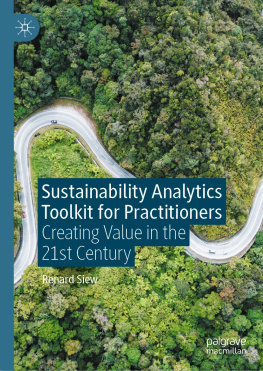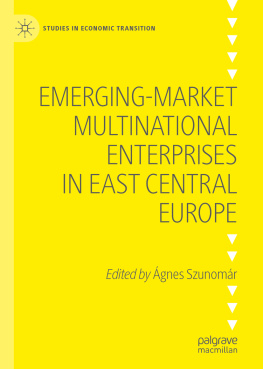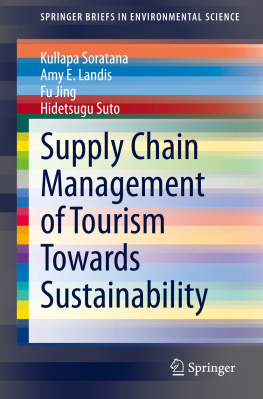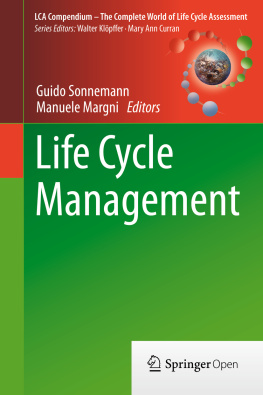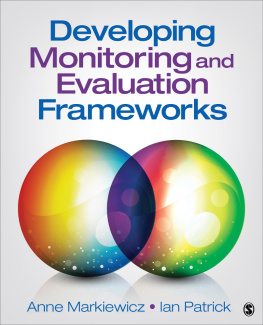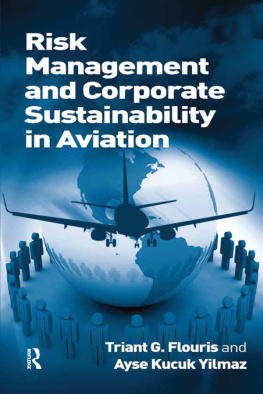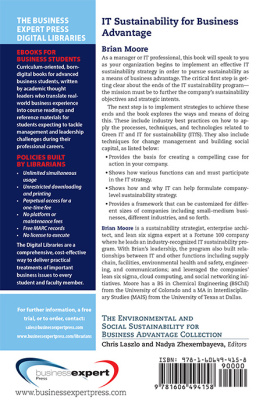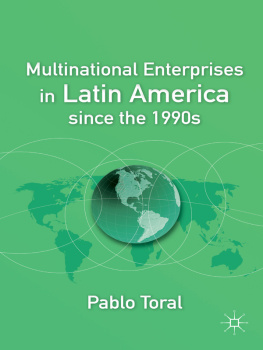Sustainability Assessments
This book looks at how multinational enterprises address sustainability within their business activities. Contextualised within a rapidly developing country in Asia, it explores how management practices, tools and techniques are implemented by foreign multinational enterprises (MNEs) operating in the Philippines. The book introduces a useful three-stage and six-step sustainability assessment framework for company practices. The three stages are framed around impact identification, impact assessment and impact monitoring, with the six steps associated with these stages, including the initiation step, scoping, impact analysis, alternative selection, monitoring and evaluation, and feedback and follow-up.
The book also highlights how voluntary guidelines and global sustainability platforms play an instrumental role in directing the practices of organisations when implementing corporate sustainability.
Hermann Lion is a Research Associate at Swinburne Business School, Swinburne University of Technology, Australia.
Jerome D. Donovan is a Senior Lecturer in Entrepreneurship and Innovation at Swinburne University of Technology.
Cheree Topple is a Senior Lecturer in Management at Swinburne University of Technology.
Rowan Bedggood is a Senior Lecturer in Marketing at Swinburne University of Technology.
Eryadi K. Masli is a Lecturer in Entrepreneurship and Innovation at Swinburne University of Technology.
Routledge Advances in Management and Business Studies
Collaborative Research in the United States
Policies and Institutions for Cooperation among Firms
Albert N. Link
Green Human Resource Management in Chinese Enterprises
Jie Shen, Jenny Dumont and Xin Deng
Developing the Workforce in an Emerging Economy
The Case of Indonesia
Edited by Kantha Dayaram, Linda Lambey, John Burgess and Tri Wulida Afrianty
Cross-Cultural Leadership
Being Effective in an Era of Globalization, Digital Transformation and Disruptive Innovation
Ahmad Muhamad Salih
The Global Pharmaceutical Industry
The Demise and the Path to Recovery
Daniel Hoffman and Allan Bowditch
Public Management and Vulnerability
Contextualising Change
Edited by Gareth David Addidle and Joyce Liddle
Sustainability Assessments
Insights from Multinational Enterprises Operating in the Philippines
Hermann Lion, Jerome D. Donovan, Cheree Topple, Rowan Bedggood and Eryadi K. Masli
For more information about this series, please visit www.routledge.com/Routledge-Advances-in-Management-and-Business-Studies/book-series/SE0305
First published 2021
by Routledge
2 Park Square, Milton Park, Abingdon, Oxon OX14 4RN
and by Routledge
52 Vanderbilt Avenue, New York, NY 10017
Routledge is an imprint of the Taylor & Francis Group, an informa business
2021 Hermann Lion, Jerome D. Donovan, Cheree Topple, Rowan Bedggood and Eryadi K. Masli
The right of Hermann Lion, Jerome D. Donovan, Cheree Topple, Rowan Bedggood and Eryadi K. Masli to be identified as the authors of this work has been asserted in accordance with sections 77 and 78 of the Copyright, Designs and Patents Act 1988.
All rights reserved. No part of this book may be reprinted or reproduced or utilised in any form or by any electronic, mechanical, or other means, now known or hereafter invented, including photocopying and recording, or in any information storage or retrieval system, without permission in writing from the publishers.
Trademark notice: Product or corporate names may be trademarks or registered trademarks, and are used only for identification and explanation without intent to infringe.
British Library Cataloguing-in-Publication Data
A catalogue record for this book is available from the British Library
Library of Congress Cataloging-in-Publication Data
A catalog record has been requested for this book
ISBN: 978-0-367-86322-7 (hbk)
ISBN: 978-1-003-01838-4 (ebk)
Typeset in Galliard
by codeMantra
This research investigates how organisations address sustainability within their business activities. Contextualised within a rapidly developing country, the research explores how management practices, tools and techniques are implemented by foreign multinational enterprises (MNEs) operating in the Philippines. Foreign MNEs have been identified as not only a key source of economic development and progress but also a basis for increasing the standards and practices being implemented within the Philippines by the private sector.
Framing this investigation is the development of a consolidated sustainability assessment framework, which provides the basis for examining the practices of these foreign MNEs. Despite being identified as a key basis in supporting the implementation of more systematic practices to address sustainability, there is scant empirical literature on how this is adopted by the private sector. This is particularly the case in developing countries, where sustainability assessments may have the greatest impact on connecting the private sector with sustainability.
A three-stage and six-step sustainability assessment framework is developed to guide this investigation. The three stages are framed around impact identification, impact assessment and impact monitoring, with the six steps associated with these stages, including the initiation step, scoping, impact analysis, alternative selection, monitoring and evaluation, and feedback and follow-up.
In empirically testing this framework, this research utilises a constructivist paradigm and qualitative research approach. A case study design is utilised to examine the practices of 24 organisations across the manufacturing, utilities and mining sectors, with 92 personnel involved in interviews across these organisations. This primary data was triangulated against secondary data sources, including sustainability reports, and analysed through thematic analysis linked to the sustainability assessment framework. A Computer Assisted Qualitative Data Analysis software (NVivo) was utilised to assist the data analysis.
Based on the thematic analysis of interviews and secondary data across these 24 organisations, empirical support has been provided for the broader sustainability assessment framework that has been developed. The findings indicate that while the framework is not reflective of a linear process within actual practice, it does cover the main management practices being implemented by foreign MNEs operating in the Philippines. Building on this, the data also provides key insights into the main tools and techniques being utilised by organisations across the process, which presents a unique contribution to the literature.
The findings and implications of this research suggest that while regulation provides a basis for triggering some practices of organisations, it is only a starting point. It is clear from the analysis of the organisations within the sample that voluntary guidelines and global sustainability platforms play an instrumental role in directing the practices of organisations when implementing a sustainability assessment.


